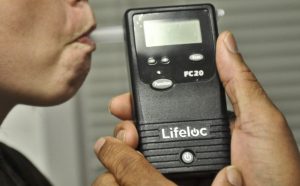Search
Does randomly re-testing employees who earlier test positive for drugs or alcohol violate the ADA?

It’s an interesting theory. And by ‘interesting,’ I mean…
Anyway, before I get too snarky, I’ll share with you the facts of this opinion from a federal court in New York that I read recently.
The “On Call program” and more random tests.
According to the plaintiffs, they were subject to random drug and alcohol testing pursuant to U.S. Department of Transportation regulations (“DOT protocol testing”). Employees who test “positive” on a DOT protocol test may enter their employer’s “On Call program,” after which the employer can subject those employees to random drug and alcohol testing in addition to DOT protocol testing.
A bunch of the plaintiffs claimed that they tested positive on one of the DOT protocol tests, received follow-up examinations and tests, and were subsequently placed in the On Call program. The remaining plaintiff was placed in the On Call program after being arrested for driving while impaired. Subsequently, all plaintiffs were subjected to random On Call tests on unspecified occasions and faced the “stigma and suspicion of ongoing drug and alcohol use,” even though each plaintiff denies drug or alcohol use when they were placed in the On Call program.
Hold on, where did I put my violin. Oh, here it is.
ADA violation?
Each of the plaintiffs sued, claiming disability discrimination in violation of the Americans with Disabilities Act; specifically that the employer treated the plaintiffs unfairly because they either had or were regarded as having an ADA-covered disability by often re-testing them for drugs and alcohol.
The court disagreed primarily because the plaintiffs never suffered an adverse employment action. That is, there’s nothing wrong with subjecting folks who fail drug and alcohol tests to additional re-tests, even if that means that they’ll be tested more frequently than those not identified as former substance abusers. It’s a “mere inconvenience.” Further, the plaintiffs’ embarrassment and public stigma of being re-tested don’t transform the decision to re-test into an adverse employment action either.
To add insult to injury, the court also determined that the plaintiffs’ remaining ADA claims were time-barred. If only someone had blogged about filing timely EEOC Charges recently. (Although, most of the plaintiffs will have the chance to re-plead those claims.)
What’s your takeaway from this case?
Some companies struggle with the mechanics of drug and alcohol testing. When? How often? How?
But, you don’t have to concern yourself with violating the Americans with Disabilities Act by entering into a “last chance agreement” or other condition of continued employment with someone who has already tested and failed. Instead, make sure that you have a drug and alcohol policy, document any violations, and clearly communicate the terms of continued employment (if you decide not to fire that person) to anyone who violates the policy.
 The Employer Handbook Blog
The Employer Handbook Blog


